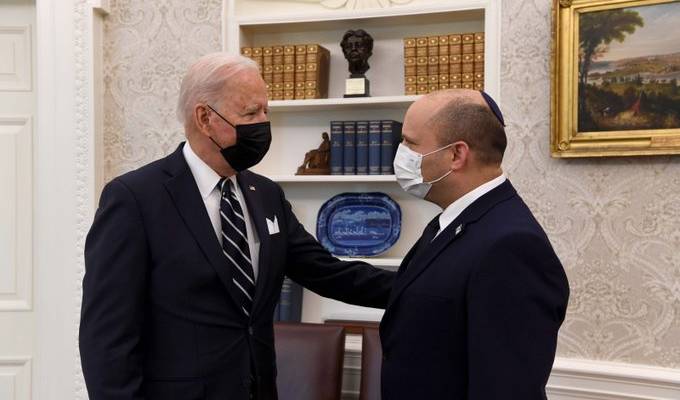Biden’s balancing act in the Middle East has a problem: Israel, claims Politico.
Following the ceasefire agreement that halted May’s Hamas-initiated conflict with Israel, US President Joe Biden told the world that “Palestinians and Israelis equally deserve to live safely and securely and enjoy equal measures of freedom, prosperity and democracy,” adding: “My administration will continue our quiet and relentless diplomacy toward that end.”
It was a statement that many felt reflected a tone of moderation with respect to Washington’s policy towards the Israeli-Palestinian impasse.
Yet, Politico has now cast doubt on Biden’s ability to strike such a balance in an article titled, Biden’s balancing act in the Middle East has a problem: Israel, in which the outlet details alleged Israeli misdeeds at great length while glossing over the perpetual issue of Palestinian terrorism and obstructionism.
The piece criticizes Israel for its designation in October of six Palestinian NGOs as terrorist organizations, framing the move as an irritant to Biden’s ‘fairness’ plan. Its verdict is clearly colored by the views of Ubai Aboudi, the executive director of one of the affected NGOs, who Politico describes as having been targeted by the “Israeli crackdowns on rights activists.”
Aboudi is quoted as saying that Biden’s commitment to peacemaking must “be reflected by holding human rights violators [i.e. Israel] accountable.”
However, Politico then notes that Aboudi has also “been targeted by the Palestinian Authority [PA], whose attempts to silence dissent also have drawn scrutiny from rights advocates.” Strikingly, though, Politico does not surmise that such actions by the Palestinian leadership have created hurdles for Biden’s foreign policy – apparently only Israel’s have.
Indeed, a prominent theme throughout the entire piece is the whitewashing of the intransigence of the Palestinian Authority and the effect Ramallah has on shaping Israel’s domestic policy in this area:
A State Department official insisted that the Biden administration wants both the Israeli government and Palestinian leaders to ‘refrain from unilateral steps that exacerbate tensions.’ That includes ‘providing compensation for individuals imprisoned for acts of terrorism,’ the official said, referring to a controversial Palestinian practice Israeli leaders often decry.”
The so-called “pay-for-slay” policy in which Palestinian terrorists who slaughter Israelis are given monthly salaries is downplayed as little more than a “controversial” practice. Yet, this policy and the PA’s obstinate refusal to change it is absolutely relevant, not least because the “Martyrs’ Fund” has directly led to Israel freezing funds it collects on the PA’s behalf, as well as the United States having previously halted aid payments to Palestinians as per the provisions of the Taylor Force Act.
Israeli Interior Minister Ayelet Shaked is also quoted, telling Politico that Israel is subjected to disproportionate criticism:
“Shaked expressed frustration that there was so much questioning of Israeli actions toward Palestinians when Palestinian militants are constantly threatening Israeli lives.
‘The fact that people compare, it’s outrageous,’ said Shaked, who is known for strident views when it comes to Palestinians. ‘Israelis are being murdered for many years by Arabs.’”
Again, the issue that Shaked raises is seemingly glossed over as just par for the course as opposed to a major obstacle to peace.
However, the ceaseless threat of Palestinian terrorism — including by the US-designated terrorist group Hamas, which is almost entirely ignored Politico’s piece — can be juxtaposed against the supposed egregious sins that Israel is guilty of, according to Politico:
“Recent reports of a rise in Israeli settler violence against Palestinians, too, have drawn concern in the Biden administration. Rights groups allege that the settler violence is part of a broader, often state-sanctioned effort to push Palestinians off of more land in the West Bank.”
It is interesting that Politico notes the concerns of organizations that claim alleged acts of violence are part of a “state-sanctioned effort” but does not bother to report the fact that the “state,” i.e. the government, has explicitly condemned any such actions by Jews living beyond the 1967 borders, including Foreign Minister Yair Lapid who labeled it a form of “terror
Politico caps its subtle anti-Israel rhetoric by touching on the Abraham Accords, the historic US-brokered agreements that it acknowledges “have seen a significant growth in diplomatic, economic and other relations between Israel and the United Arab Emirates, Bahrain, Sudan and Morocco.”
But bizarrely, the article suggests the deal has been another impediment to peace, arguing “the accords have left the Palestinians feeling betrayed by Arab countries they long considered allies.”
While some Palestinians may feel the deals were a mark of disloyalty by those who should support their cause, it is baffling that Politico chooses to ignore the attitude taken by the PA, which could have used the Abraham Accords as a vehicle for peace.
Instead, Ramallah has chosen to stick to its maximalist positions and antagonistic views rather than taking the opportunity to return to the negotiating table with Israel.
In a piece ostensibly about balance, it is a shame that Politico could not have demonstrated some of this quality in its reportage.
Israel is not the fly in Biden’s foreign policy ointment – it is a whole lot more complicated than that.
